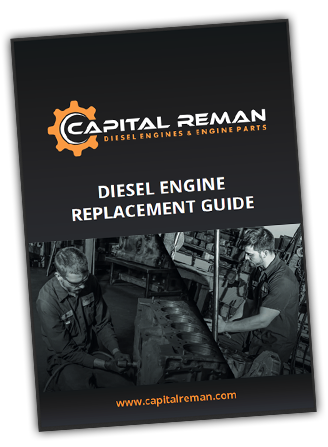Diesel History
Cummins X12 Engine Review
For centuries the argument has raged. Does size matter? Well, if you like great performance, power and copious amount of torque, the answer is a resounding no. At least in the world of diesel engines. Currently being tested on the roads of North America, the X12 is a massive 600LBS lighter than other medium bore engines and has been especially designed for weight sensitive applications and for vehicles where the X15 has more grunt that’s needed for the task. ... read more »
Caterpillar Inc., Under the Gun with $2.4 Billion IRS Audit
Things are not starting the the new year off right for manufacturing giant Caterpillar, Inc. Last year the IRS came down on Caterpillar for attempting to use some creative accounting practices to avoid paying tax on earned income. The investigation by the IRS started many years ago and was officially entered into legal precedent last March. Investigators have stated that Caterpillar has evaded paying their full share of taxes going back 18 years. If found to be true the company used illegal tax strategies to save over $2.4 billion. ... read more »
The Curious Case of Rudolf Diesel
It is a surprise that Volkswagen hasn't blamed Rudolf Christian Diesel for their recent woes as if he hadn’t invented the damned diesel engine they wouldn’t have had to cheat the emission figures. What is not in doubt is that the man was an engineering genius.
Diesel was born in Paris in 1858 to Bavarian immigrants but when he was 12 years old his parents were forced to flee France because of the Franco-Prussian war. They settled in London but soon after Diesel was dispatched to live with his uncle and aunt in Augsburg, a relatively small Bavarian city, best known for being the birthplace of Mozart’s parents.
The purpose of this was so that Diesel could become fluent in German whilst being educated at Königliche Kreis-Gewerbeschule (Royal Circle Vocational College), where his uncle taught math. ... read more »
Common Differences Between Marine and Industrial Diesel Engines
There is no standard diesel engine for every application. For example there are industrial applications, truck application, electrical power generation, RV applications, heavy duty emergency, pumps and of course marine applications. Although, each engine is slightly different the core design is the same. The exhaust, cooling, electrical and fuel systems are all different in marine engines. This article will discuss the differences between industrial diesel engines and their marine counterparts. ... read more »
Cummins N14 Specs, History and Problems
The Cummins N-14 is a great engine; quite possibly the best Cummins engine ever produced. These engines are the stuff dreams are made of if you’re an old school guy looking for reliability. No doubt, the N14 is part of “1,000,000 mile club”. The engine features the best of engineering fundamentals mixed with one of the first electronic control system. First designed in the late 1980s it was sent into full production in 1991. The N14 engine is the follow up to the vastly popular Cummins 855 Big Cam which was produced 1976-1985. Cummins listened to it customers and designed a more powerful version of the 855 while maintaining a similar profile and bore/stroke architecture. Overall, the biggest structural difference between the 855 and N14 is the air-to-air cooling system changes but both engines are very similar. ... read more »
CAT C7 Specs and Engine History
At the turn of the century there was a lot of buzz around a new diesel engine being produced at Caterpillar, one that could meet the growing emissions requirements enacted by the EPA. The Caterpillar C7 Engine was supposed to be the “golden child” in Caterpillar diesel engine lineup; one that combined raw horsepower with computer controlled clean emissions. However, sometimes things don’t go according to plan. The engine was produced from 2003 to 2009 and was installed primarily in over the road medium duty class 8 trucks. All of the big players in the trucking industry hopped on board hoping the CAT C7 was going to live up to the hype. Paccar Freightliner, Ford and GMC all purchased the engine in droves ... read more »
Reasons for Excessive Oil Consumption in Diesel Engines
The most common place for the diesel engine builder to look for leaks, on the outside of the engine, is crankshaft. If nothing is found you can then then work your way up the engine. First, look for any oil leakage at the seals at the end of the crankshaft. If everything looks fine the next logical place to look for leakage at the oil pan gasket and all lubrication connections. If there are still no leaks you should inspect the crankcase breather. This is a very common spot for oil leaks which are caused by a combustion of gas around the pistons. ... read more »
Diesel Dominates India
Diesel is big business internationally. The vast majority of places outside of the United States continue to use diesel in passenger vehicles nearly as much as gasoline based engines. Despite recent emission scandals with Volkswagen and Fiat Chrysler sales continue to rise across the world. ... read more »
Why Do Diesel Engines Last So Long?
Our good friend "Adept Ape" who is a master engine builder and YouTube Blogger recently released a video breaking down the various reasons why diesel engines last so much longer than gasoline engines. Let's dive in and discuss the three major reasons why diesel engines are so durable: ... read more »
How Large Diesel Marine Engines Work
This is a great old video from the MAN Corporation about the basic principals of how large diesel marine engines operate. Take a look. ... read more »
Cummins Engine History: American Gumption
Like most success stories, the history of Cummins Engine Company, started from humble beginnings and a perseverance to try something new. The early days of Cummins Engines were not like what we have all come to expect from the power generation giant of today. In fact the company almost folded a few years after its start. ... read more »




